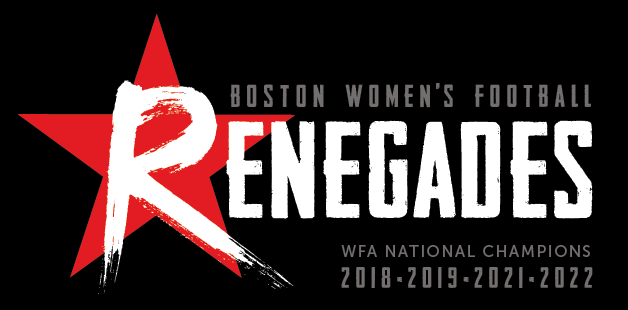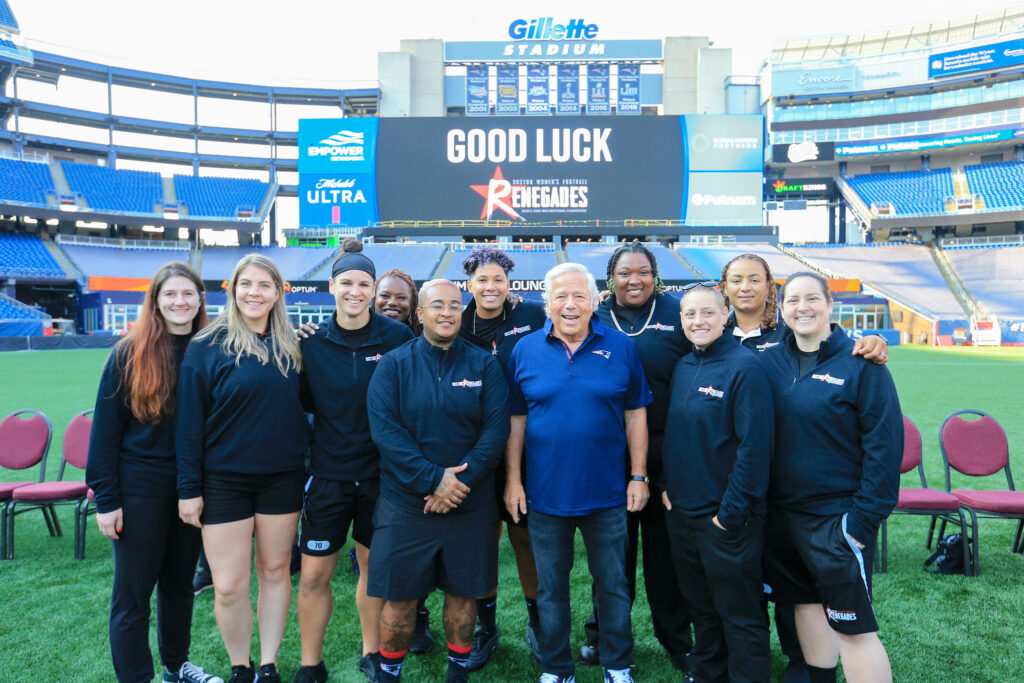Mary Frandson | ESPN.com
July 23, 2021
It’s not every day the Boston Renegades, a team in the Women’s Football Alliance, receives a surprise video call from New England Patriots owner Robert Kraft offering the Patriots’ charter plane to fly them to a national championship game.
But that’s exactly what happened July 14 when Renegades owner Molly Goodwin and star wide receiver Adrienne Smith took the video call before the lead-up to Boston’s pursuit of the franchise’s sixth WFA championship. The Renegades (6-0) flew to Canton, Ohio, on Thursday. They will face the Minnesota Vixen (7-0) in the title game at Tom Benson Hall of Fame Stadium on Saturday.
The Renegades, who were featured in ESPN’s “Born to Play” documentary in 2020, and the Vixen, who are the longest-running active team in women’s football, are the premier teams in the WFA.
There are more than 15 WFA players who have earned coaching and scouting positions in the NFL, including Katie Sowers — who, while with the San Francisco 49ers became the first female to coach in a Super Bowl — and the Washington Football Team’s Jennifer King, who is the first Black woman to be a full-time NFL coach.
There’s plenty more to learn about this league, its players and this weekend’s championship game. With help from Vixen coach Ryan McCauley and owner Laura Brown, here some answers as well as behind-the-scenes insight about the women’s tackle football league that boasts more than 60 teams nationwide and in Canada.
How long has the WFA been around, and when does the season start each year?
The league, established in 2009, began its inaugural season with 36 teams. Most were already well established in other leagues, such as the Women’s Professional Football League, Independent Women’s Football League and National Women’s Football Association. The regular season for three divisions of teams runs from the first weekend in May through the championship games in mid-July. For a team like the Vixen, McCauley says, team workouts start with combine-like tryouts in October and November, and then practices are two to three times a week, starting in January.
How many players typically make up each team?
Teams can vary greatly in size, fluctuating between Division 3 (smallest) and Pro (largest) teams, according to McCauley. There are teams that have 20 or fewer players, and then there are teams such as this season’s title teams, the Vixen and Renegades, that each boast rosters of 50-plus players.
Are WFA players paid like NFL players are paid?
No, WFA players are not paid to play, and the majority of coaches in the league are volunteers. Depending on a variety of factors, players can pay up to $1,000 a season to play, which includes league fees, equipment costs, team costs (such as facility rental for practice) and travel expenses. Many teams provide fundraising opportunities and allow for player sponsorships and scholarships to offset costs as much as possible.
Who is in charge of the WFA? Is there a commissioner or a board of directors? What about a players’ union?
Lisa King serves as the WFA’s current commissioner, and there is also a board of owners. The players do not have a union, but they do have an action committee, which any player can be a part of in order to present leaguewide issues to the owners.
Are there any special rules for the WFA? What is the biggest rule difference between the WFA and the NFL?
McCauley said: “We play by NCAA football rules, with minor exceptions that allow for tinted helmet visors and a mercy rule for a team to ask for a running clock and the opposing team to remove their starting QB and RB. This happens at times in regional regular-season games between higher- and lower-division opponents. To limit travel costs, teams often play outside of their own division.”
What makes the Vixen the most talented team you’ve seen on the field?
Brown said: “We picked up a lot of great rookies, and I think also we have some great coaching staff that has been able to maximize some of our other veterans. They’re getting some great play out of them.”
How has the coronavirus pandemic affected Minnesota’s team?
Brown said: “It’s kind of an odd thing, but I think in some ways COVID helped us. Some of our players were able to get healthy, and of course we have a bigger rookie class because we have the 2020 rookies and the 2021 rookies, who are all healthy, which helps a lot. With the little gymnasium we were practicing in, it was too small — we couldn’t get everybody in there and be able to do spacing like we want to, so we actually reevaluated our budget and our priorities and figured out a way to get into the dome two days a week. Being able to hit the turf right away made a huge difference for us. What really makes this team different is that there’s a strong family feeling this year.”
Last year, the death of George Floyd became a catalyst for the sports world’s racial justice movement. Being in Minnesota, how did you see that affect the Vixen?
Brown said: “With everything that Minneapolis and the Twin Cities has been through since George Floyd’s death happened, that’s something that had the potential to tear a team apart. We have a lot of different personalities on the team, and a lot of different people with diverse backgrounds, and instead of allowing it to pull the team apart, they came together and said, ‘You know what, this organization here, this is my safe zone, this is where I can come and find a little bit of a refuge.’ We kind of saw each other as people, and through that, the team bonded a little more. … They have things that they worry about with their families and their lives, but you really learn to see them as people, even though they might be very different from you, you can connect through sports.”
How does it feel to be headed to Canton to play in the championship game?
Brown said: “To be in the national championship itself is a major accomplishment. Boston has been the best team in the league by far for a couple of years, so we have our work cut out for us. There’s a lot of hopefulness and excitement on the team right now, which is a lot of fun. There’s a lot of hopefulness around women’s football and female sports and female athletes, and that just kind of all builds. Being in Canton makes it extra special, knowing that the league has a five-year deal with Canton is amazing. The Patriots owner, Robert Kraft, did a huge send-off; the Minnesota Vikings [of the NFL] have been reaching out to us. The Minnesota Lynx [of the WNBA] have been supporting us the last couple of years, so that support from the sport’s community has really helped a lot.”
What can we expect from this title matchup between two undefeated teams?
Brown said: “Boston is going to try and throw on us a lot. [Boston’s] Allison Cahill is a very good quarterback. Our secondary is very young, so I think they’re going to try and pick on our secondary a lot. We’re going to try and get a lot of pressure on her [Cahill] with our front four; if we can get some pressure on her, we might disrupt their passing game. That’s one of the big things to look for from us defensively. Offensively, Grace Cooper has gotten to be a better and better running back every year. She’s been amazing. She led the league in rushing yards. She was the offensive league MVP. For us to get some acknowledgement like that and respect around the league is huge for us for growing our program. I’m looking for Grace to have a big day.”
And the biggest challenge the Vixen will encounter in Saturday’s game is …
McCauley said: “The biggest challenge, other than the team across the field from us, is to keep our focus. One of the things that we preach is that we can’t beat ourselves. Boston is a great team, and they’ve made it a habit to make teams pay for mistakes, like turnovers and missed assignments. On the biggest stage, in the biggest game of their careers, can we stay focused on going 1-0 every play and have those start turning into great drives, great quarters and a great game of football. If we can do that, we can compete with any team in our league. Even the two-time defending champions.”

